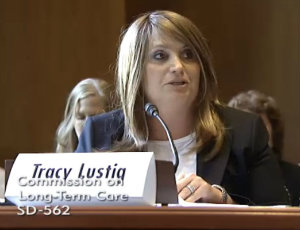 Dr. Tracy Lustig testified in August before the Commission on Long-Term Care.
Dr. Tracy Lustig testified in August before the Commission on Long-Term Care.One of my biggest surprises in the passage of the Patient Protection and Affordable Care Act (PPACA) was the inclusion of title VIII, the CLASS ACT, which created the possibility of a national, voluntary, premium-financed, and federally administered long-term care insurance program.
While the benefits might have been small and delivered through our only marginally adequate long-term care system, at least it was a start and a step toward recognizing the serious long-term care needs of our aging population.
Unfortunately, the program was never able to get off the ground—unable to reconcile a reasonable benefit package, with affordable premiums, in the face of adverse selection effects in any voluntary program (i.e., where those who specifically suspect that they will need the benefit are more likely to join the program). And despite being declared a squib by the U.S. Department of Health and Human Services (HHS), Congress decided to add insult to injury and actually repealed this particular title of the law as part of one of the deficit deals. Not all of those PPACA repeals have been entirely symbolic, I guess.
In return for the elimination of the CLASS ACT, Congress called for a national long-term care commission to review the situation and make recommendations to address the issue. The Commission on Long-Term Care was established under Section 643 of the American Taxpayer Relief Act of 2012 (P.L. 112-240), signed into law on Jan. 2, 2013.
The statute directs the Commission to: "...develop a plan for the establishment, implementation, and financing of a comprehensive, coordinated, and high-quality system that ensures the availability of long-term services and supports for individuals in need of such services and supports, including elderly individuals, individuals with substantial cognitive or functional limitations, other individuals who require assistance to perform activities of daily living, and individuals desiring to plan for future long-term care needs."
Despite an initial “sitzkrieg” of inaction frighteningly similar to the never-convened health care workforce commission authorized under PPACA itself, the Commission has moved forward with a series of public meetings and no doubt private discussions under the leadership of its Chair Dr. Bruce Chernof of the SCAN Foundation and Vice Chair Mark Warshawsky. As I understand it, the Commission will complete its work by the end of September and issue its report to Congress.
 To achieve that goal, while most of America was on vacation (or at least I was), on Aug. 20 the commission met to hear testimony for the fourth and final time, including comments from Dr. Tracy Lustig (nee Harris) based on her work as study director for the 2008 Institute of Medicine (IOM) report “Retooling for an Aging America: Building the Health Care Workforce,” financed by the John A. Hartford Foundation.
To achieve that goal, while most of America was on vacation (or at least I was), on Aug. 20 the commission met to hear testimony for the fourth and final time, including comments from Dr. Tracy Lustig (nee Harris) based on her work as study director for the 2008 Institute of Medicine (IOM) report “Retooling for an Aging America: Building the Health Care Workforce,” financed by the John A. Hartford Foundation.
The hearing transcript is available as a PDF online. Check out page 86 for Dr. Lustig’s remarks and, even more interesting, her answers to the commissioners’ questions and discussion starting around page 121. Or watch the video on the Integrated Senate Video Player (Dr. Lustig’s testimony begins at the 2:53:20 mark with the start of the second panel).
Despite the fact that policy change is probably the most powerful tool for improving the care that older Americans receive, it is also one of the most frustrating. Sometimes I despair that the recommendations of the Retooling report have not had the impact that they deserved, despite the hope and the ongoing efforts we have all put into their implementation.
Nonetheless, when I read something like this serious discussion still based on the credibility of that 2008 IOM report, my regrets recede. Change can be slow and the process maddening, but if we are steadfast and use the tools we have, we have every chance to succeed.
How do you eat an elephant? One bite at a time.
